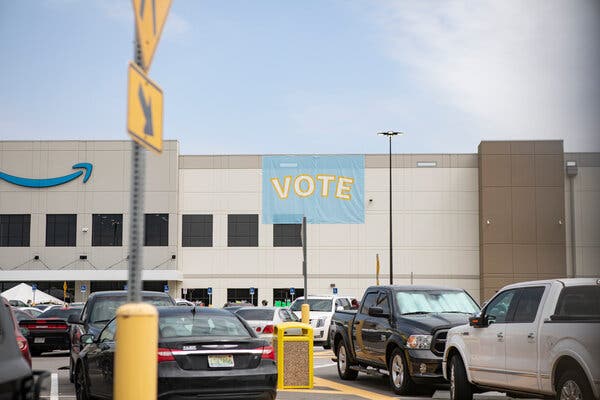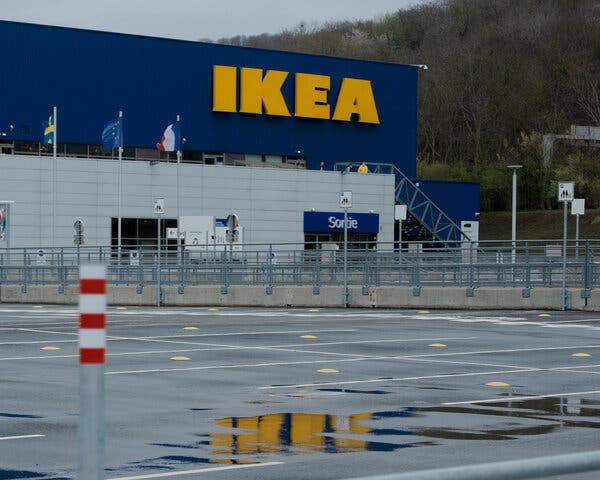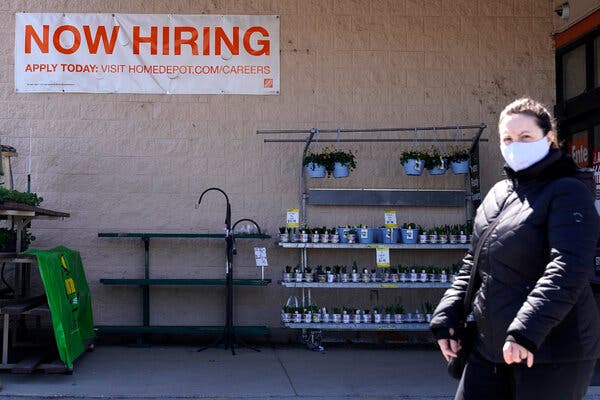The job market remains challenging, with the government reporting Thursday that initial claims for state unemployment benefits rose last week.
A total of 741,000 workers filed first-time claims for state jobless benefits last week, an increase of 18,000, the Labor Department said. It was the second consecutive weekly increase after new claims hit a pandemic low.
At the same time, 152,000 new claims were filed for Pandemic Unemployment Assistance, a federal program covering freelancers, part-timers and others who do not routinely qualify for state benefits. That was a decline of 85,000.
Neither figure is seasonally adjusted.
Claims rose above one million early in the year but have come down since then, helped by the spread of vaccinations, the easing of restrictions on businesses in many states and the arrival of stimulus funds.
Most individuals received payments of $1,400 in recent weeks as part of the Biden administration’s $1.9 trillion relief package, and the funds should bolster consumer spending in the coming months.
On Friday, the government reported that employers added 916,000 jobs in March, twice February’s gain and the most since August. The unemployment rate dipped to 6 percent, the lowest since the pandemic began, with nearly 350,000 people rejoining the labor force.
Still, there is plenty of ground to make up.
Even after March’s job gains, the economy is 8.4 million jobs short of where it was in February 2020. Entire sectors, like travel and leisure, as well as restaurants and bars, are only beginning to recover from the millions of job losses that followed the pandemic’s arrival.

The union seeking to represent workers at an Amazon warehouse in Alabama said late Wednesday that there were 3,215 ballots cast — or about 55 percent of the roughly 5,800 workers who were eligible to vote.
The ballots are expected to be counted by hand starting either Thursday afternoon or Friday morning in the National Labor Relations Board’s office in Birmingham, according to the Retail Wholesale and Department Store Union. Hundreds of ballots are being contested, mostly by Amazon, the union said.
The vote counting will be shown on a videoconference call to a small number of outsiders, including journalists, in addition to representatives from the union and the company.
Union elections are typically held in person, but the labor board determined that the election should be conducted by mail to minimize risks during the pandemic. The ballots were sent to workers in early February and were due at the agency before March 30. Since then, Amazon and the union have had a chance to challenge whether particular worker were eligible to vote.
When the public counting is done, the agency will announce the formal results if the margin of victory for one side is greater than the number of contested ballots.
If the margin is narrower, then it could take two to three weeks for the N.L.R.B. to hold a hearing to sort through the contested ballots and take evidence from both sides on whether they should be counted.

Officials are calling Taiwan’s drought its worst in more than half a century. And it is exposing the enormous challenges involved in hosting the island’s semiconductor industry, which is an increasingly indispensable node in the global supply chains for smartphones, cars and other keystones of modern life.
Chip makers use lots of water to clean their factories and wafers, the thin slices of silicon that make up the basis of the chips, Raymond Zhong and Amy Chang Chien report for The New York Times. In 2019, Taiwan Semiconductor Manufacturing Company’s facilities in Hsinchu consumed 63,000 tons of water a day, according to the company, or more than 10 percent of the supply from two local reservoirs.
In recent months, the government has:
But the most sweeping measure has been the halt on irrigation, which affects 183,000 acres of farmland, around a fifth of Taiwan’s irrigated land.
The Taiwanese public appears to have decided that rice farming is less important, both for the island and the world, than semiconductors. The government is subsidizing growers for the lost income. But Chuang Cheng-deng, 55, worries that the thwarted harvest will drive customers to seek out other suppliers, which could mean years of depressed earnings.

Prosecutors are accusing the French arm of Ikea, the Swedish home furnishings giant, and some of its former executives of engineering a “system of espionage” from 2009 to 2012, in a criminal trial that has riveted public attention in France.
The alleged snooping was used to investigate employees and union organizers, check up on workers on medical leave and size up customers seeking refunds for botched orders, Liz Alderman reports for The New York Times. A former military operative was hired to execute some of the more clandestine operations.
In all, 15 people are charged. A verdict from a panel of judges is scheduled for June 15.
The case stoked outrage in 2012 after the emails were leaked to the French news media, and Ikea promptly fired several executives in its French unit, including its chief executive. There is no evidence that similar surveillance happened in any of the other 52 countries where the global retailer hones a fresh-faced image of stylish thriftiness served with Swedish meatballs.
Victims’ lawyers described a methodic operation that ran along two tracks: one involving background and criminal checks of job candidates and employees without their knowledge, and another targeting union leaders and members.
Ikea’s lawyer, Emmanuel Daoud, denied that systemwide surveillance had been carried out at Ikea’s stores in France. He argued that any privacy violations had been the work of a single person, Jean-François Paris, the French unit’s head of risk management.
Emails and receipts showed that Mr. Paris handed much of the legwork to Jean-Pierre Fourès, who surveilled hundreds of job applicants, gleaning information from social media and other sources to speed vetting and hiring. He also did background checks on unsuspecting customers who tangled with Ikea over big refunds. He insisted that he had never broken the law in gathering background material.
The surveillance encompassed career workers. In one case, Mr. Fourès was hired to investigate whether Ikea France’s deputy director of communications and merchandising, who was on a yearlong sick leave recovering from hepatitis C, had faked the severity of her illness when managers learned she had traveled to Morocco.

-
Carnival Cruise Line, the largest cruise operator in the United States, is optimistic that several of its U.S.-based lines will be up and running by July, it said on Wednesday as it reported its first quarter financials. Booking volumes for future Carnival cruises were about 90 percent higher in the first quarter of 2021 than in the previous quarter, “reflecting both the significant pent-up demand and long-term potential for cruising,” Arnold Donald, the chief executive of Carnival Corporation, the cruise line’s parent company, said in a statement on Wednesday. The company reported a net loss of $2 billion for the first quarter of 2021.
-
Unions representing employees at two prominent podcasting companies owned by Spotify, the audiostreaming giant, announced Wednesday that they had ratified their first labor contracts. The larger of the two unions, with 65 employees, is at The Ringer, a sports and pop culture website with a podcasting network. The second union, at the podcast production company Gimlet Media, has just under 50 employees. The two groups were among the first in the podcasting industry to unionize, and both are represented by the Writers Guild of America, East.

-
S&P 500 futures were up on Thursday, pointing to a rise when Wall Street trading starts, a day after the benchmark index set another record the previous day. Investors are awaiting the latest weekly jobless claims report, which could provide a fresh measure of a strengthening economy.
-
European markets were mostly higher and Asian stocks had a mostly positive day. Oil futures were lower, and Treasury yields slipped.
-
Investors on Wednesday were buoyed by remarks in the minutes of the Federal Reserve officials’ meeting last month, which suggested policies that have supported the markets and businesses through the pandemic were not about to be removed.
-
Fed policymakers have said they want to see “substantial further progress” toward their employment and inflation goals before scaling back the accommodative measures.
-
Weekly jobless claims numbers, to be released later on Thursday, come amid growing confidence about hiring in the U.S. economy. The payrolls report for March showed an impressive gain of 916,000 jobs. But even with that improvement, the economy is still 8.4 million jobs short of where it was in February 2020.
-
Investors are also digesting more details of President Biden’s corporate tax plan, which aims to raise as much as $2.5 trillion over 15 years. It includes a strict new minimum tax on global profits and cracking down on companies that try to move profits offshore.
Stocks, bonds and oil
-
In European, trading the Stoxx Europe 600 was 0.4 higher after hitting a record high at the close of trading on Wednesday. In Britain, the FTSE 100 was also 0.4 percent higher. In Asia, the Hang Seng in Hong Kong ended the day 1.2 percent higher.
-
In New York, S&P 500 futures were 0.3 percent higher, after the index rose 0.2 percent on Wednesday.
-
Oil futures were slipping, as rising coronavirus infections weigh on projections of oil demand. Brent crude, the global benchmark, was 0.2 percent lower at $63 a barrel, and the U.S. benchmark, West Texas Intermediate, fell 0.5 percent, to $59.47 a barrel.
-
Yields on 10-year Treasury notes were down more than 2 basis points, to 1.64 percent.






